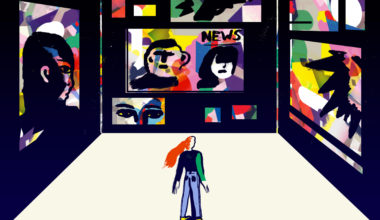You’ve accepted that you need to go to therapy — but getting yourself out of the door and into the office feels like an insurmountable challenge. After all, most of us aren’t familiar with therapy. We don’t know what we’re going to say. Should we actually lie on the couch like they do in movies, or is it okay to just sit? (Sitting, by the way, is fine and often preferred.)
Overcoming your fear of therapy is the only way to reap the benefits that it can provide. Here are five common reasons people avoid getting treatment. Do any ring true for you?
1. Facing Scary Feelings Is (You Guessed It) Scary
No one will ever claim therapy is easy — and if they do, they might not be telling the full truth. Even the world’s most serious therapy advocates will acknowledge the stress: you’re trusting a near-stranger with your deepest secrets and biggest worries, and hoping they’ll stitch your psyche back up!
Therapy requires digging deep and exposing your inner self. Self-exploration is frightening — but necessary. Remember the saying: “Things get worse before they get better.” Sometimes, that goes for your mental health, too.
Take the first step now and soon you’ll be past those frightening feelings. Never forget the biggest benefit of therapy: You’ll have a professional by your side the whole time.
2. Therapy Can Take a Long Time…Will It Even Work?
Healing a lifetime of wounds, and even just feeling a little less stressed at work, isn’t an overnight process. Research shows that 50% of patients require 15 to 20 sessions — that’s three months, if you go weekly. If you haven’t even gone to one session, that timeline can be daunting. You want to get better now, not three months from now.
However, if you procrastinate on starting therapy, you’re only doing future-you a disservice. You can’t get better if you don’t put in the time. Every moment wasted in deliberation could have gone to improving your mental health and taking steps forward. Also, three months can sometimes go by in a snap, just think of how quick summer felt when you see the first leaves change.
Psychiatry and prescriptions online
Receive an evaluation and prescription for mental health medication (if needed) from a psychiatry-trained medical provider.
3. The Shame Can Be Consuming
But what if my neighbor sees me walking out of my therapist’s office?, you might wonder. The idea that someone else might know your most personal struggles can be enough to keep you out of therapy — but you can’t let people’s perceptions hold you back.
First: You’re not alone. About four in 10 U.S. adults, or 42%, have sought therapy. If your neighbor spots you sneaking from your therapist’s office, so what? She’s probably been in treatment, too.
Second: The American mental-health stigma of “it’s all in your head” can be pervasive and damaging. You wouldn’t feel ashamed going to a doctor’s office to treat your low blood pressure, would you? Your brain is no different. No matter your diagnosis, your mental health is your health and it needs — nay, deserves — treatment.
4. “My Friend Had a Bad Experience, So I Will, Too”
As unfortunate as it is, sometimes you and the first therapist you visit just won’t click. Maybe that was the case with your friend: they attended a session, hated their therapist and never went back. Or — as happens in all professions — your pal simply ran into someone who wasn’t as good as they would have liked.
It’s easy to consider our acquaintances experiences to be universally true, but panic not: 76% of Americans said their time in therapy was either “very” or “somewhat” positive. Only six percent had a negative experience. Chances are excellent that you, too, will feel happy about working with a therapist. Although it can be hard to not be anxious at first, try to focus on the long-term benefits over the short-term discomfort you may feel. Remember why you are taking this step!
5. “I’m Not Crazy…Right?”
Some people avoid therapy for the same reasons they avoid medical treatment: Because their symptoms aren’t “that bad.” For example, you just get a little angry sometimes or, you’re only sad once in a while — even though those “once in a while” days involve spending time curled up in bed and unable to function. You might feel that other people have bigger problems and believe that therapists spend their time fixing these more serious issues. Everyone has their own experiences, backgrounds, and feelings — what you have problems with matters, whether it’s big or small.
Your symptoms may feel minor, but even minor symptoms can indicate a big problem. Better to get a check-up, right?
But perhaps that “check-up” still seems frightening. Again, like with medical treatment, you might be scared of a diagnosis. Remember a label doesn’t change anything about you. Knowing you have bipolar disorder won’t alter your behavior — but it will make finding treatment easier.
Yes, therapy can be scary, and you might end up dedicating a few months to the process, but the result is worth every second.
Talkspace articles are written by experienced mental health-wellness contributors; they are grounded in scientific research and evidence-based practices. Articles are extensively reviewed by our team of clinical experts (therapists and psychiatrists of various specialties) to ensure content is accurate and on par with current industry standards.
Our goal at Talkspace is to provide the most up-to-date, valuable, and objective information on mental health-related topics in order to help readers make informed decisions.
Articles contain trusted third-party sources that are either directly linked to in the text or listed at the bottom to take readers directly to the source.




